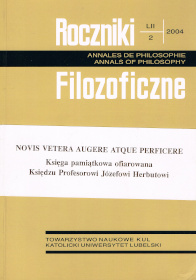The Valuing Dimension of the Category of the Rationality of Science
Abstract
The paper is an attempt to reflect on the valuing dimension of the category of the rationality of science, ontological and epistemological problems. Such problems should be solved should rationality be deemed a valuing category. Taking into consideration the discussions on the valuing character of the categories in ethics (good, evil) and the significance of moral judgements as the point of departure, I am posing a question about the importance of expressions with regard to the rationality of science, expressions treated as valuing expressions. Since the beginning of the reflections on science until now it has contained valuing and normative elements. This was irrespective of whether it took the form of logic, epistemology, methodology or philosophy of science. Moreover, the above disciplines were treated as, of their nature, formulating the ideal of knowledge and providing rules of a valuing cognition. In the twentieth century the central concept on which the discussions focused was the category of rationality. The question was how to define a valuable scientific knowledge and how to pursue science. We find some problems when we want to interpret the category of rationality as a valuing category. These problems seem to be good examples of questions that should be answered, while interpreting other epistemic categories as valuing. Including the category of the rationality of science in the valuing categories is tantamount to the conferral of a valuing sense on the statements about the rationality of science, the predicator „rational” and its antonyms.
The standpoints in question, the interpretations of valuing statements are as follows: anti-naturalism, naturalism, cognitivism, and acognitivism. They answer such questions as: 1) what kind of feature is rationality? 2) what are its relationships with other features, in particular with the features examined by the natural, or broadly, empirical sciences? 3) does the feature of being rational or the relationship of being a good reason on behalf of something really exist? 4) what kind of predicator of the predicator „rational” and its antonyms? 5) what are their relations to other predicators, in particular those predicators which the natural, or broadly, empirical sciences make use of? 6) what kind of propositions are the statements about the rationality of science? 7) what do the statements about the rationality of science denote, or do they denote anything really existing? 8) what are the relationships of the statements of the rationality of science to other statements, in particular the statements formulated by natural sciences, e.g. cognitive psychology? The review of various manners by which to use the category of rationality in the philosophy of science speaks on behalf of the rejection of extreme interpretations: both extremely cognitivist and acognitivist. In the statements about rationality there are now two components: descriptive (object-related) and valuing. The valuing component may be understood in at least three inseparable and often coexisting manners: approving/disapproving, perfectionist and normative.
Copyright (c) 2004 Roczniki Filozoficzne

This work is licensed under a Creative Commons Attribution-NonCommercial-NoDerivatives 4.0 International License.





